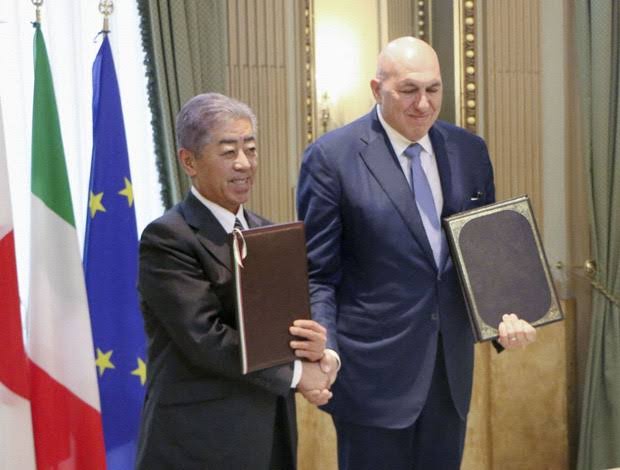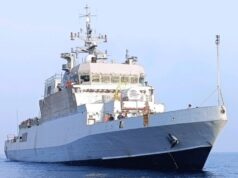Japan, Italy sign defence supply-sharing pact

Japanese Foreign Minister Takeshi Iwaya, left, and Italian Defense Minister Guido Crosetto pose for photos in Rome on Nov. 25, 2024, after signing an acquisition and cross-servicing agreement between the two countries
Japan and Italy concluded a pact on Monday to facilitate the exchange of defence supplies and logistical support, with the two nations strengthening their security ties in response to China’s increasingly provocative military activities.
Japanese Foreign Minister Takeshi Iwaya and Italian Defence Minister Guido Crosetto signed the acquisition and cross-servicing agreement in Rome, ahead of a two-day Group of Seven foreign ministerial meeting through Tuesday in Italy.
The accord streamlines procedures for the provision of supplies and services such as food, fuel, ammunition and repair work, between the Japan Self-Defence Forces and the Italian military.
At the signing ceremony for the deal, Iwaya said that close collaboration between the two countries’ forces will be “further encouraged.”
Japanese Prime Minister Shigeru Ishiba’s administration plans to seek parliamentary approval for the agreement during the 150-day ordinary session set to convene in January, according to sources close to the matter.
Japan’s acquisition and cross-servicing agreement, or ACSA, with Italy, a G-7 member, follows pacts with the rest of the G-7 — Britain, Canada, France, Germany, and the United States — as well as Australia and India.
Japan and Europe have been ramping up security cooperation in recent years, sharing concerns over China’s maritime assertiveness in the East and South China seas and Russia’s protracted invasion of Ukraine since February 2022.
Earlier on Monday, Iwaya told British Foreign Secretary David Lammy that Tokyo will prepare to hold the first meeting of their new bilateral framework for dialogue also involving economic ministers “early next year,” the Japanese Foreign Ministry said.
The launch of the economic version of the “two-plus-two” talks, mainly intended to discuss trade and economic security, was agreed upon during Ishiba’s meeting with British Prime Minister Keir Starmer in Brazil last week on the fringes of the Group of 20 summit.




